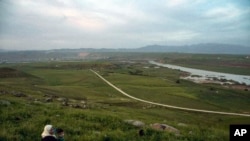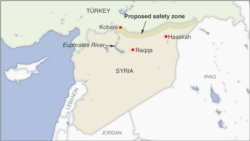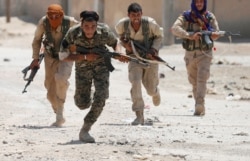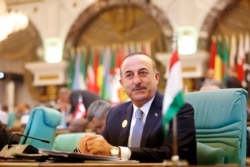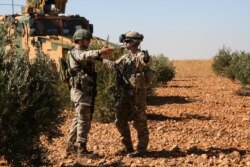The United States is promising a new agreement with Turkey will help ease tensions and alleviate Ankara’s concerns in northeastern Syria, even as Turkish officials accuse Washington of letting prior agreements stall.
U.S. and Turkish officials unveiled the deal Wednesday, following three days of talks in the Turkish capital.
It calls for the establishment of a joint operations center in Turkey that would then coordinate the creation of a “safe zone” in northeast Syria, where Turkish officials have expressed increasing alarm over the presence of Syrian-Kurdish fighters.
The U.S. Defense Department late Wednesday described the agreement as a crucial step, though it said more work needs to be done.
The talks “made progress toward establishing a sustainable security mechanism in northeast Syria that addresses the legitimate concerns of our NATO ally Turkey,” Pentagon spokesman, Commander Sean Robertson, told VOA in statement.
“The security mechanism will be implemented in stages,” he added. “The United States is prepared to begin implementing some activities rapidly as we continue discussions with Turkey."
Turkish officials had been threatening to send troops into northeastern Syria and move against Syrian Kurdish forces in the region.
Those forces, under the umbrella of the Syrian Democratic Forces and with U.S. backing, played a key roll in collapsing the Islamic State terror group’s self-declared caliphate. They have also been crucial to efforts to maintain stability and root out IS sleeper cells.
But Turkey has long viewed the Kurdish SDF fighters, many with ties to the Kurdish People's Protection Units (YPG), as an extension of the Turkey-based Kurdistan Workers' Party (PKK). Both Ankara and Washington consider the PKK, which has been engaged in a bloody war with the Turkish military for three decades, a terrorist organization.
On Thursday, Turkey’s foreign minister warned the U.S. the new deal must be implemented quickly.
"We will not allow these efforts [on the safe zone] to turn into the Manbij roadmap," Mevlut Cavusoglu told reporters.
The Manbij roadmap, an agreement last June between Turkey, the U.S. and other NATO allies, called for members of the YPG to withdraw from the key town of Manbij.
But progress has been slow, for which Turkey blames the U.S.
“The United States delayed this with many excuses, such as joint patrols," Cavusoglu said.
While the new agreement to establish a safe zone in northeastern Syria seems to have postponed an imminent military action by Turkey, key details, like the size of the zone remain unresolved.
Heading into this week’s talks, the U.S. had proposed a two-tier zone that would be 14 kilometers deep. That is less than half the size Turkey had demanded. Turkey had also been requesting ultimate authority over the area, control that the U.S. has been hesitant to grant.
Earlier this week, U.S. Defense Secretary Mark Esper said warned Turkey any unilateral military action in northeast Syria would be "unacceptable.”




